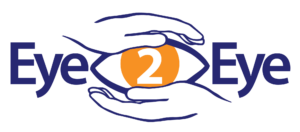About Us
Our Mission

Eye2Eye is here to help build resilience, navigate the challenges of vision loss and celebrate victories one step at a time.
The need for our services:
Losing vision, whether suddenly or gradually, is often a highly stressful and sometimes traumatic experience, with many unknowns and new challenges to navigate. The process and accompanying emotions affect not only those facing vision loss, but also families and other loved ones who have their own distinct adjustment needs.
The need for emotional support services aimed at helping individuals and their families adjust to vision loss is substantial and yet relatively few such targeted services exist. Responding to this gap, Eye2Eye was developed in October of 2019 to provide support to the blind and visually impaired community.
Program Overview
The Eye2Eye program resides within the Department of Psychiatric Rehabilitation and Counseling Professions at Rutgers University School of Health Professions. Eye2Eye is a free, phone-based, peer support program, designed to help adults from across the country who are blind or visually impaired and their families adjust to the challenges of vision loss. Callers to the program are paired with trained peer support specialists who are also living their lives with low or no vision. These peer support specialists connect with clients on a regular basis to provide social and emotional support, practical information, mentorship, and community resources. At Eye2Eye, callers are given close, personalized attention tailored to their needs.
Adjusting to vision loss is overwhelming. Many people leave the doctor’s office with a condition leading to vision loss and have no idea where to turn or what to do. Many feel afraid, hopeless, and isolated when suddenly faced with such a life altering loss. Our trained peer support specialists have shared experiences of vision loss and serve as a support system to provide callers with resources and hope. Eye2Eye serves as a crucial emotional support system for callers and provides a bridge to needed vision resources and mental health services. Talking through challenges with others who understand can make all the difference!
The program is also a space for family members to receive support for themselves when caring for someone with sight loss. Our peer support specialists can help educate family about how to best help their loved ones and navigate their own feelings and concerns.